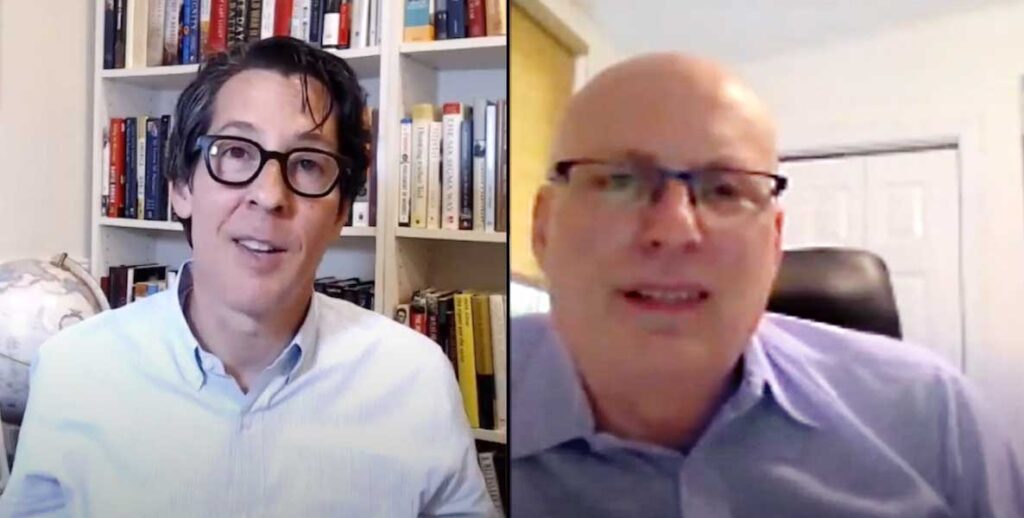Joe Torsella has worn many public service hats: Rhodes Scholar, deputy mayor, founding CEO of The National Constitution Center, U.S. rep to the United Nations and, now, the 77th Treasurer of the Commonwealth of Pennsylvania.
“I wanted to do three things as Treasurer,” he said. “I wanted to restore integrity and accountability and bring some real reform to State government. I wanted to be a tough fiscal watchdog. And I really wanted to use this office to rebuild that we,” he said, referencing “We the people,” the three words that have been his touchstone.
Below are six other gems we gleaned from the convo, which was attended by more than 100 guests. If you missed it, you can check out the full conversation here, and be sure to join us for our next virtual chat on Wednesday, June 24, with Penn Medicine Head of Innovation Roy Rosin.
1. He’s saved the Commonwealth piles of money.
For one thing, he’s saved taxpayers $700 million by shutting the door on Wall Street corruption and middlemen. “When something profoundly affects Pennsylvania, I’m going to use our resources to make our voice heard and to stand up for Pennsylvanians when they’re getting abused,” he said.
2. He’s worked with awe-inspiring leaders.
From Ed Rendell, Torsella learned the power of persistence and determination: “Over and over again I saw him in public life will things into being.” From George H.W. Bush, he learned: “Above all, the power of decency and kindness. He is among the two or three most decent people I ever met in my life. He had an abiding kindness to people across every rank and station.” And from Barack Obama: “He just sort of exuded an American presence that was who I thought we were, who I hope we’ll be again, who we haven’t been in a while. A dignity and a grace that is who I imagine a President should be.”
3. Author Buzz Bissinger has played a pivotal role in his life.
In his famous treatise on Philadelphia, A Prayer For The City, Bissinger writes about the passion of a younger Torsella, then the Deputy Mayor of Policy under Ed Rendell. But, Torsella shared, “The best thing he ever did for me was not that characterization.” The author is also responsible for setting Torsella up on a blind date with the woman who would go on to become the love of his life, and his wife for nearly 25 years, attorney Carolyn Short.
4. He’s fueling educational opportunities for PA’s next generation.
Torsella’s Keystone Scholars program provides every child born or adopted in PA with a $100 deposit into a 529 Fund. That may only grow to about $500 by the time that child graduates from high school but, said Torsella, “more importantly, it’s a message about who we are in this state.” Recent research on the program found that it raised the rate at which parents are opening their own 529 accounts for their own kids by a factor of two, across every demographic. “These kids are part of our Pennsylvania future, and the idea [was] that we could start to even out the playing field,” he said.
5. He’s a bookworm.
Calling in from his home library, Platt asked Torsella to read some of the titles on his shelves. There were biographies (Henry Clay), there were business books, there was Bowling Alone, there was…The Idiot’s Guide to Fly-Fishing. And over the course of the call, it became clear that Torsella knows his Greek myths, to boot: Of the potential for the Treasurer to move the needle on policy, he cited Archimedes’ “Give me a place to stand and I’ll move the world.” Of the challenge of staying hopeful, he invoked Sisyphus’s battle against that pesky boulder.
6. He believes public institutions can still be a force for good.
“No matter how bad it gets—and it’s gotten bad, and I think we’re living through a moment where we’re being honest about how bad certain issues have gotten—in our political DNA needs to be the belief that no matter how badly we’ve done, we can do better,” he said. “Because I care about government means I have to be harder on it, not easier on it,” he said. “When institutions fail, we have to rededicate ourselves into reshaping them into what they’re supposed to be.”
Amen.

